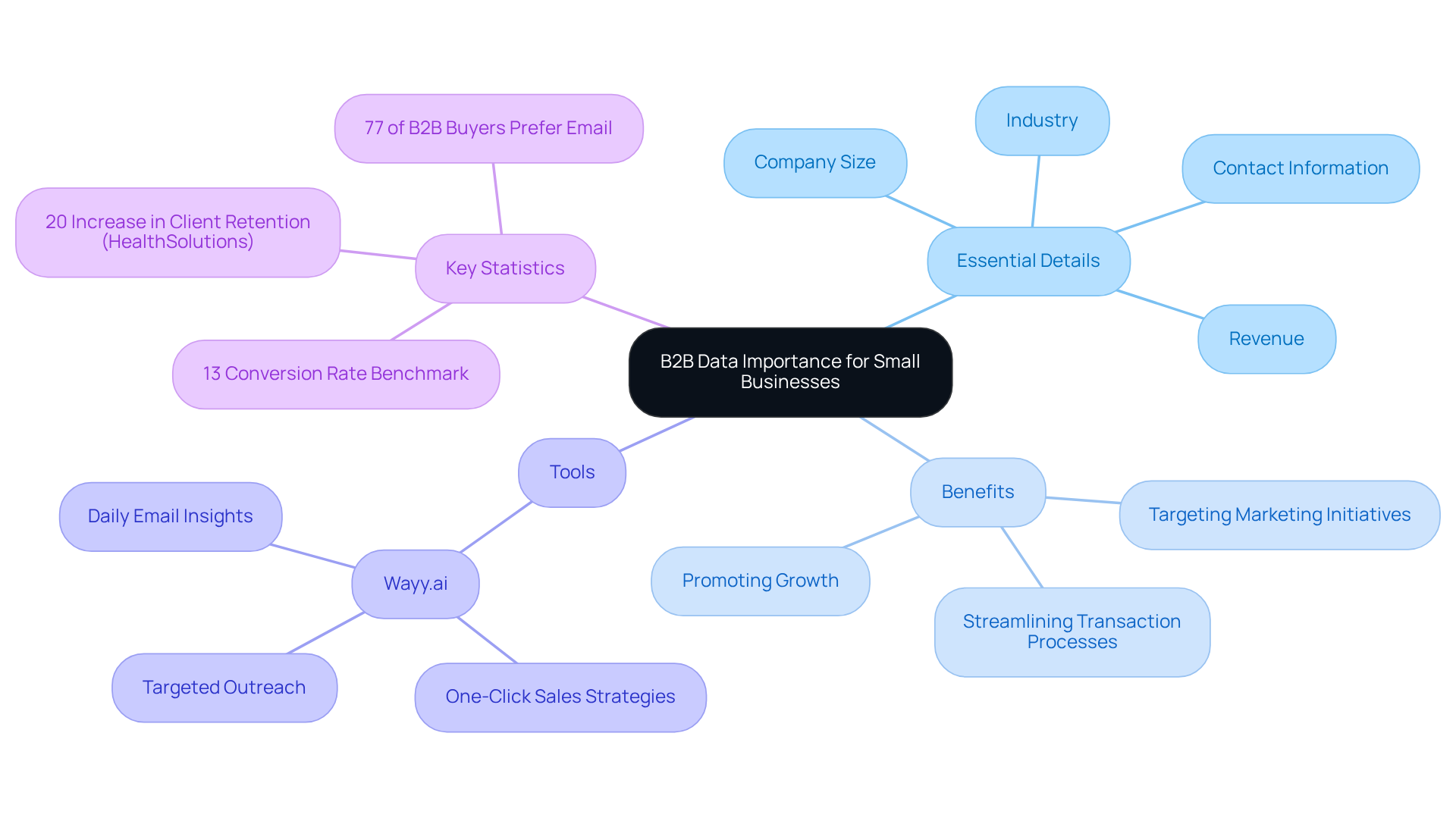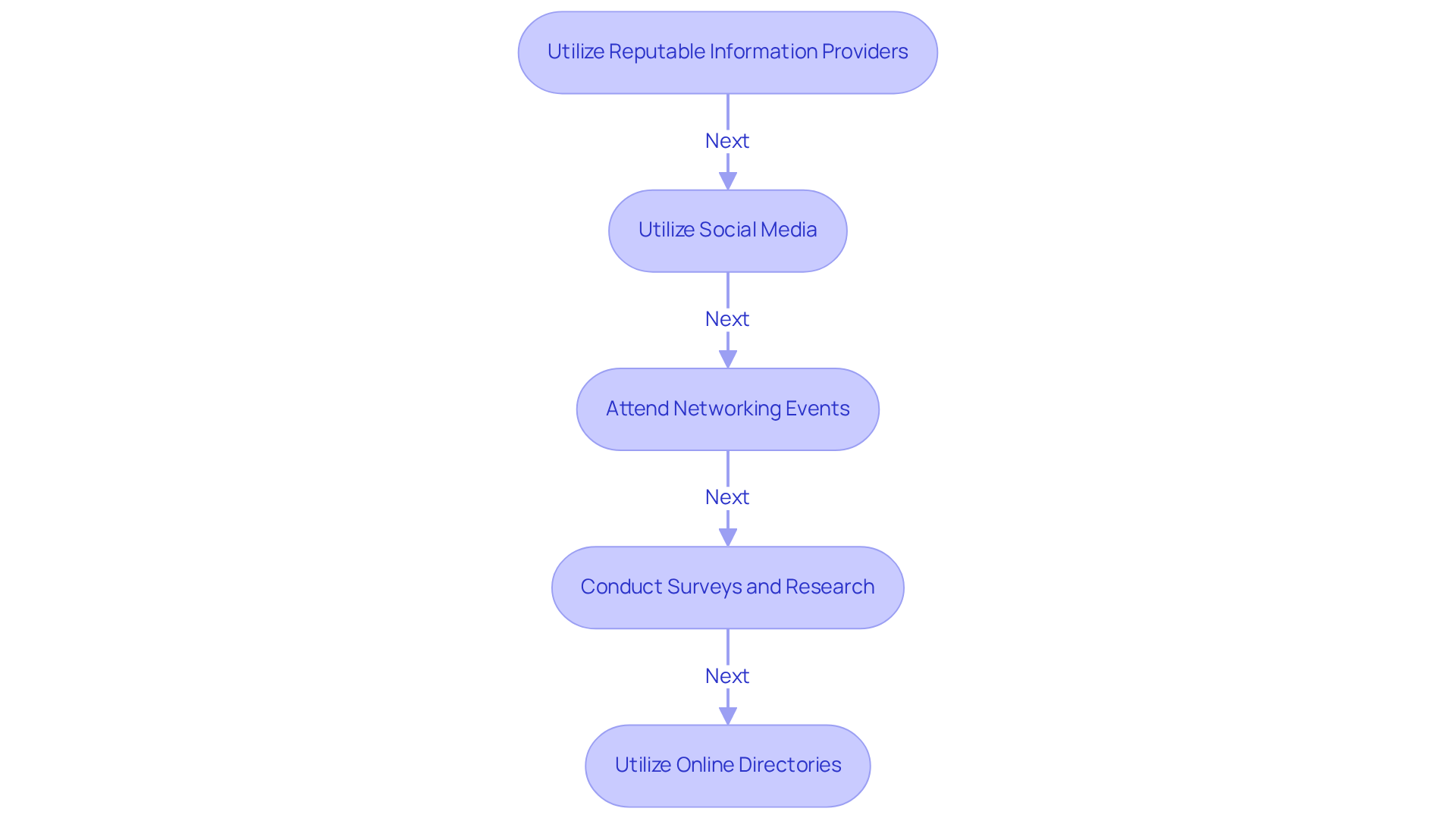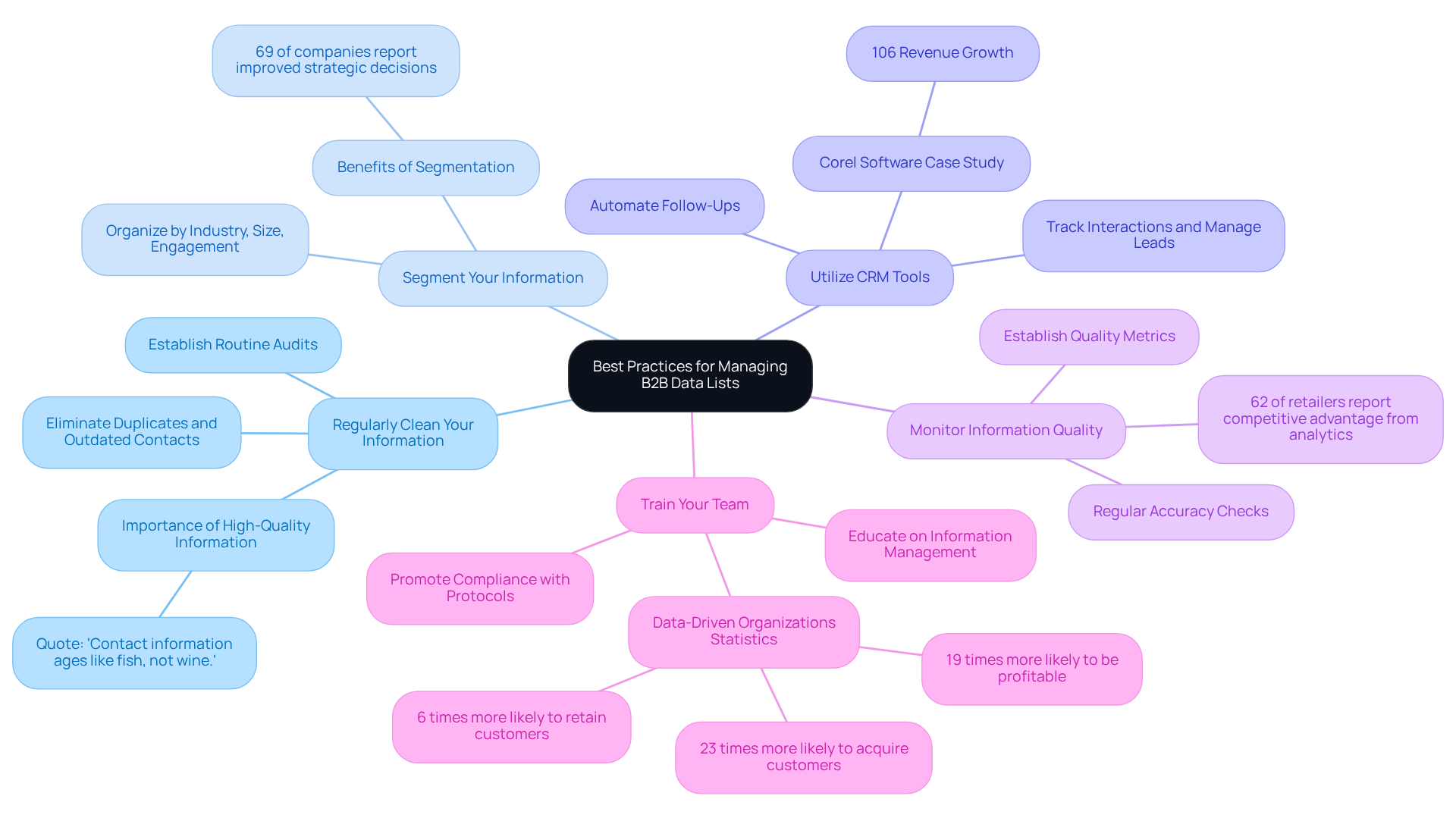Overview
This article highlights essential practices for small business owners to effectively master B2B data lists, recognizing their crucial role in successful marketing and client acquisition. We understand the challenges you face, and we’re here to support you. By outlining strategies for sourcing, managing, and leveraging B2B data, we emphasize how accurate and well-organized information can significantly enhance your outreach efforts. Imagine the difference it could make in improving your conversion rates and driving your business growth. Together, we can navigate these strategies and empower your success.
Introduction
B2B data lists form the essential backbone of successful marketing and sales strategies for small businesses. They serve as a crucial tool for understanding and engaging with potential clients. By harnessing accurate and targeted B2B information, small business owners can significantly enhance their outreach efforts, streamline processes, and ultimately drive growth.
However, we understand that navigating the ever-evolving landscape of data management can be daunting. How can entrepreneurs ensure they are not only sourcing high-quality data but also effectively utilizing it to maximize their success? Together, we can explore these challenges and find the solutions that empower your business to thrive.
Define B2B Data and Its Importance for Small Businesses
B2B data lists are vital for organizations seeking to recognize, understand, and connect with other firms. It includes essential details such as company size, industry, revenue, and the contact information of decision-makers. For small enterprises, leveraging B2B information is crucial for effectively targeting marketing initiatives, streamlining transaction processes, and promoting growth. Accurate B2B information empowers small business owners to make informed decisions, align their marketing strategies, and engage prospects at the right moments, significantly boosting conversion rates.
With Wayy.ai, small business owners can take advantage of features like one-click sales strategies and targeted outreach to strengthen their client acquisition efforts. Daily email insights from Wayy.ai deliver key metrics on how many leads were reached, who expressed interest, and how conversion rates are improving. This enables data-driven adjustments to marketing strategies. In fact, did you know that 77% of B2B buyers prefer to be contacted via email? This statistic highlights the importance of precise targeting.
Without a solid understanding of , small enterprises risk falling behind in a competitive landscape, missing valuable opportunities to connect with potential clients and enhance their market presence. Furthermore, the conversation rate benchmark for B2B companies stands at 13% for marketing qualified leads to sales qualified leads, providing a clearer expectation for outcomes.
For instance, HealthSolutions saw a remarkable 20% increase in client retention rates by implementing AI algorithms for personalized content. This illustrates the profound impact of data-driven strategies and the effectiveness of Wayy.ai's features. Together, we can navigate these challenges and achieve success in your business endeavors.

Source B2B Data Effectively: Strategies for Small Business Owners
To effectively source B2B data, small business owners can embrace several nurturing strategies:
- Utilize reputable information providers: Investing in established B2B data lists from providers like ZoomInfo or Data Axle can be a game-changer. These platforms provide comprehensive B2B data lists that offer verified and current information, including essential contact details and company insights. This ensures accuracy in your outreach efforts. Additionally, Wayy.ai can enhance this strategy by incorporating information from these providers into its one-click sales playbook, making it easier to access trustworthy insights.
- Utilize Social Media: Platforms such as LinkedIn are invaluable for gathering B2B information. Engaging with industry groups, following potential clients, and utilizing LinkedIn Sales Navigator can help identify key decision-makers. With 75% of buyers using to influence their purchasing decisions, this approach can significantly enhance your lead generation efforts. Wayy.ai's tools can assist you in tracking engagement and identifying trends within your target audience.
- Attend Networking Events: Participating in industry conferences, trade shows, and local commercial gatherings can help you connect with potential clients and collect contact cards. These interactions are instrumental in expanding your database and establishing valuable relationships. Wayy.ai can support you in organizing and following up on these connections through its outreach features.
- Conduct Surveys and Research: Creating surveys to gather insights directly from your target audience not only aids in collecting information but also promotes connections with prospective clients, enhancing engagement and trust. Wayy.ai can facilitate this process by providing templates and analytics to interpret survey results effectively.
- Utilize Online Directories: Websites like Yellow Pages or niche-specific directories can offer lists of enterprises within your target market. These resources can help expand your outreach efforts and identify new opportunities. Wayy.ai can integrate these directories into its platform, allowing for seamless access to potential leads.
Common Pitfalls: As small business owners, it’s essential to be cautious about relying solely on a single source of information, as this can lead to gaps in knowledge. Diversifying your information sources and regularly refreshing your database can help mitigate this risk. Moreover, it's vital to avoid overwhelming potential clients with too much information at once, as this can lead to disengagement.
By utilizing these strategies, small business owners can build robust B2B data lists that enhance their outreach and sales initiatives, ultimately fostering growth and success. As Naveen Kumar emphasizes, transforming complex statistics into actionable insights is crucial for effective decision-making in sourcing B2B information.

Implement Best Practices for Managing B2B Data Lists
To manage B2B data lists effectively, small business owners can benefit from adopting these best practices:
- Regularly Clean Your Information: Establish a routine for auditing and cleansing your lists. It’s essential to eliminate duplicates, outdated contacts, and inaccuracies to preserve the integrity of your information. Remember, high-quality information is invaluable. As noted, organizations that prioritize quality can significantly enhance their operational processes. As Gregg Thaler aptly puts it, "Contact information ages like fish, not wine … it gets worse as it gets older, not better."
- Segment Your Information: Organize your information into segments based on criteria such as industry, company size, or engagement level. This targeted approach allows for personalized communication, which can lead to improved sales performance. Have you considered how segmentation might transform your outreach? Research shows that businesses utilizing information segmentation experience improved strategic decisions, with 69% of companies employing big analytics citing this advantage.
- Utilize CRM Tools: Investing in a Customer Relationship Management (CRM) system can help you . CRMs facilitate tracking interactions, managing leads, and automating follow-ups, ultimately streamlining your sales processes. Organizations that efficiently employ CRM systems, like Corel Software, have experienced significant advancements in customer retention and acquisition, realizing a revenue growth of 106% through proficient information handling and segmentation.
- Monitor Information Quality: Establish metrics to evaluate the quality of your information. Regularly check for accuracy and relevance to ensure your outreach efforts are based on reliable information. It’s comforting to know that organizations embracing data-driven practices are more likely to make informed decisions that enhance operational efficiency. Notably, 62% of retailers report that information and analytics create a competitive advantage.
- Train Your Team: Educate your team on the significance of information management and best practices. Promoting compliance with protocols for information entry and upkeep can cultivate a culture of precision. As information literacy becomes increasingly vital, teams that recognize the importance of accurate information are better positioned to thrive in a competitive environment. Did you know that data-driven organizations are not only 23 times more likely to acquire customers, but they’re also six times as likely to retain customers and 19 times more likely to be profitable?
By implementing these best practices, small business owners can ensure their B2B data lists continue to be a valuable asset that drives effective sales strategies. Together, we can achieve success in navigating these challenges.

Conclusion
Mastering B2B data lists is not just essential; it's a lifeline for small business owners striving to flourish in a competitive landscape. By effectively harnessing B2B data, businesses can enhance their marketing strategies, streamline operations, and ultimately drive growth. This article highlights the critical importance of accurate and comprehensive B2B information, empowering small enterprises to connect with potential clients and make informed decisions that lead to successful outcomes.
Key insights discussed include:
- The significance of sourcing quality B2B data from reputable providers
- Leveraging social media for lead generation
- Implementing best practices for managing data lists
Strategies such as:
- Regular data cleaning
- Segmentation
- Utilizing CRM tools
are vital for maintaining the integrity and relevance of information. Moreover, we showcase the transformative impact of data-driven practices, demonstrating how businesses can significantly improve their conversion rates and customer retention through effective B2B data management.
In conclusion, we encourage small business owners to view B2B data as a crucial asset for growth and success. By adopting the strategies and best practices outlined, you can navigate the complexities of data management, ensuring your outreach efforts are both targeted and effective. Embracing these practices not only enhances operational efficiency but also fosters lasting relationships with clients, ultimately leading to a competitive advantage in the marketplace. Together, we can achieve success by prioritizing the power of data.
Frequently Asked Questions
What is B2B data and why is it important for small businesses?
B2B data refers to information about other businesses, including details such as company size, industry, revenue, and contact information of decision-makers. It is important for small businesses as it helps them effectively target marketing initiatives, streamline transaction processes, and promote growth.
How does accurate B2B data benefit small business owners?
Accurate B2B data empowers small business owners to make informed decisions, align their marketing strategies, and engage prospects at the right moments, which can significantly boost conversion rates.
What features does Wayy.ai offer to help small businesses with B2B data?
Wayy.ai offers features like one-click sales strategies and targeted outreach to strengthen client acquisition efforts, along with daily email insights that provide key metrics on leads, interest levels, and conversion rates.
What is a notable statistic regarding B2B buyer preferences?
A significant statistic is that 77% of B2B buyers prefer to be contacted via email, emphasizing the importance of precise targeting in marketing efforts.
What risks do small businesses face without a solid understanding of B2B data?
Without a solid understanding of B2B data lists, small businesses risk falling behind in a competitive landscape, missing valuable opportunities to connect with potential clients, and enhancing their market presence.
What is the conversation rate benchmark for B2B companies?
The conversation rate benchmark for B2B companies is 13% for marketing qualified leads to sales qualified leads, providing a clearer expectation for outcomes.
Can you provide an example of a business benefiting from data-driven strategies?
HealthSolutions saw a 20% increase in client retention rates by implementing AI algorithms for personalized content, demonstrating the effectiveness of data-driven strategies.




